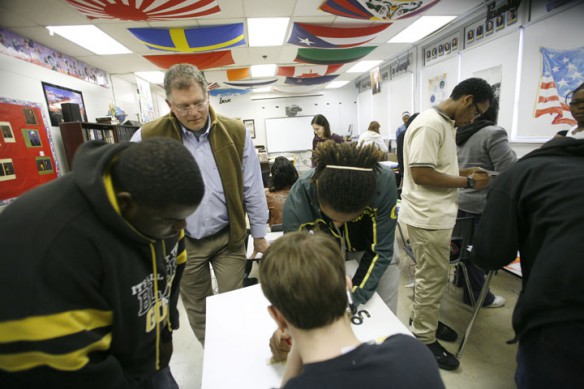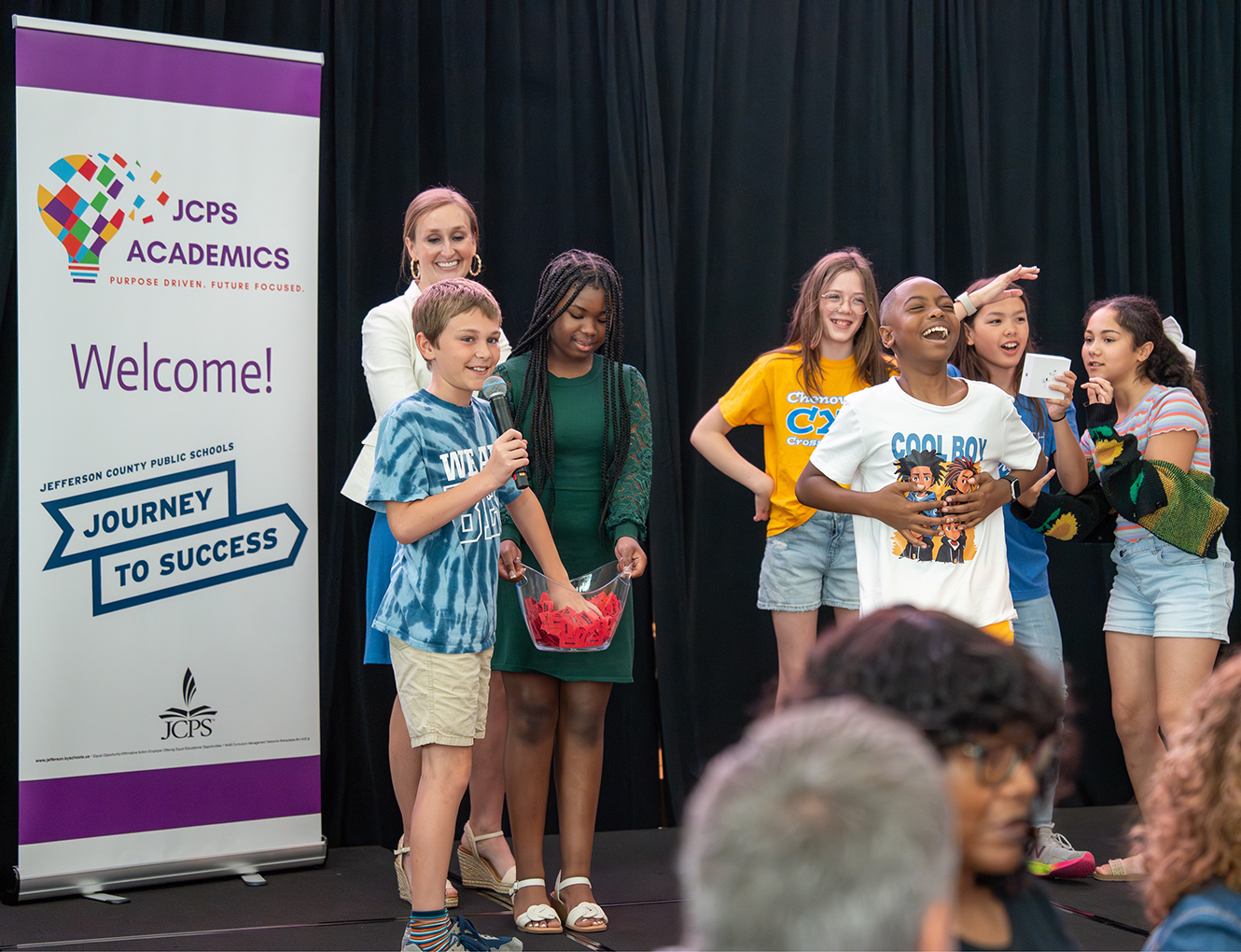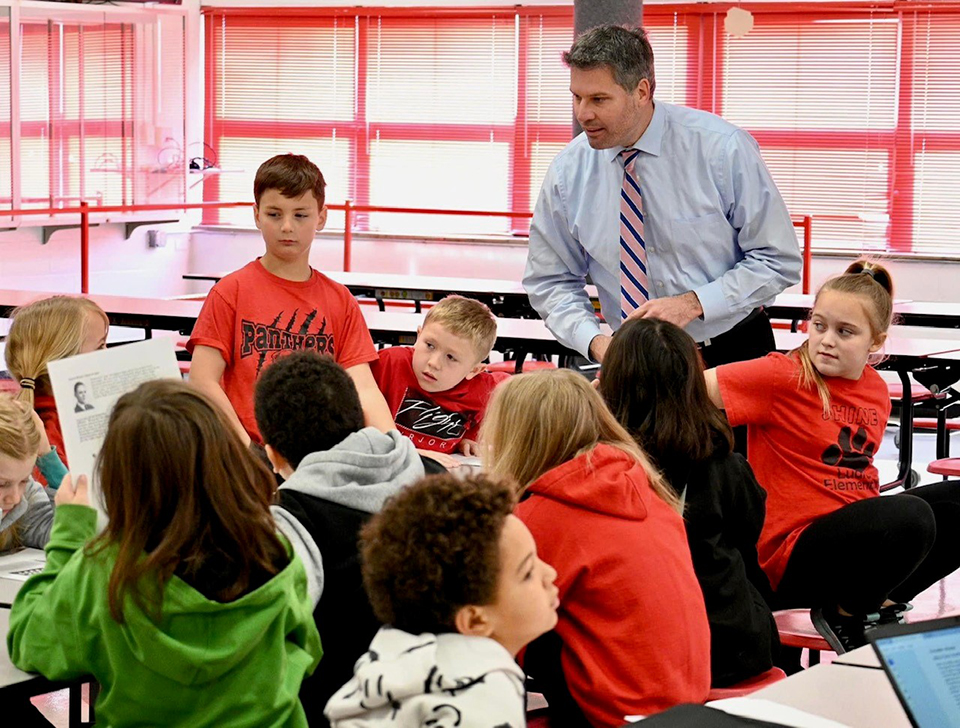
Joe Gutmann watches over students creating hallway posters to remind fellow students to watch their language during his law and government class at Central High School (Jefferson County). Photo by Amy Wallot, Jan. 31, 2012
By Matthew Tungate
Joe Gutmann, Central High School (Jefferson County) law and government teacher, believes that building a better world starts in schools and is carried out into communities. So when he got opportunity to partner with the state government agency that enforces the laws that make discrimination illegal, he knew it was a natural fit.
“The Kentucky Commission on Human Rights is a very important agency,” he said. “Certainly its mission and goals are similar to what we hope to achieve in our classroom: helping others, protecting the rights of others.”
Gutmann, a licensed attorney in his 11th year in the classroom, asked his junior law and government students if they would like to be part of a new organization that would address and seek solutions to civil and human rights concerns that are often encountered in their school. Virtually his whole class agreed to participate, Gutmann said.
The Youth Human Rights Council isn’t like a Student Council, which can be a political contest between the most popular students, he said.
“We’re embracing anybody. If you want your voice heard on any student issue, come to our meeting and you’ll have a forum. Maybe it will be something that amounts to a very significant issue. The students often have the best answers,” Gutmann said. “Sometimes young people tend to think that the older people don’t listen to them enough, and sometimes there’s some truth to that. This is just an opportunity for them to at least feel like, ‘Our voice is being heard.’ Hopefully somebody is listening on the other end.”
The Kentucky Commission on Human Rights created the Youth Human Rights Councils program last year and is helping three schools, including Central High, establish their councils, according to Glenda Green, human rights specialist and facilitator of the youth council program at the commission.
Green has met with students at Central, Seneca (Jefferson County) and Bardstown (Bardstown Independent) high schools. Participants “want to be change agents in and through their youth councils in their respective schools,” she said.
“They’re going to be challenged to look at some of those things they said they were concerned about or felt were issues people needed to take a second look at. From there they’re going to build mini-campaigns in taking a topic and making it into something that will not be too uncomfortable and will allow people to come to the table and learn something new about something that may have been going on for a long time,” Green said. “Taking something old and looking at it in a new way will hopefully open the door to allow conversations to happen and relationships to be formed, and who knows what else can come out of it.”
At Central High, students decided to address cussing in the hallways first. DeVictor McElroy, president of the school’s Youth Human Rights Council, said Gutmann raised the issue during class, and someone suggested they should put up signs in the hallway encouraging students to watch their mouths.
“We all just want to share what we have in this classroom with the school,” he said. “I think we don’t understand how much say we have in the school.”
Gutmann said he is sponsor of the council, but not the leader. He wants to steer away from telling students what issues they should address.
“The issues they want to address should be their issues,” he said.
Council board member Alize Galbreath said, “We started this to give students a say on what goes on here.”
Green said she will provide training for council members on how to meet and organize, as well as what types of things they can do to raise awareness of issues. From the meetings she has already had, she’s heard about bullying, harassment and discrimination.
“Race is always going to be an issue that is going to be challenging for each generation to come until we get a handle on it,” she said.
However, she will not tell the students how they should deal with any of the issues, or even which issues to raise, Green said.
“It’s really going to be, how do we have a diverse group of people come to the table and still maintain some type of decorum and respect, to talk about issues that sometimes adults have difficulty talking about,” she said.
That’s right in the wheelhouse of Jill Bickel, who teaches 11th-grade English, Human Rights and International Studies at Seneca High School. The 11-year veteran teacher and council sponsor worked as a counselor with underprivileged and troubled teens before teaching.
“SHS will benefit from such a program because there are so many benevolent kids here who are genuine in their desire to help others. In addition, all schools can benefit from discussing problems concerning human rights since many people whose rights are violated are silenced in schools and in society in general,” Bickel said. “The council can hopefully become an instrument through which those voices can be heard.”
So far students have said they would like to address racism, sexism, bullying and socioeconomics, she said. They also have talked about a divide between students in Honors, Advanced and Advanced Placement (AP)-level classes.
“I believe the council will function as a forum to discuss issues concerning human rights within our school as well as the community,” Bickel said. “Moreover, we want to instill in the members a sense of activism and overall concern for the lives of those whose human rights have been violated in some manner.”
Rose Dodson, community careers coordinator, is one of the sponsors of the STRIDE (Students Tolerating and Respecting Individual Rights in Everyone) Club at Bardstown High. Students from STRIDE and the Student Council are participating in the school’s Youth Human Rights Council.
The main objectives for this council are to get students involved in their schools and community; to relate to human rights and its principles in classroom and school situations; and to encourage other students to participate in setting rules and guidelines in the school as it pertains to the rights of others, she said.
“I think this opportunity will be good for Bardstown and our school. It will cause many of us to take a second look, maybe discuss ‘What are human rights?’ I think the Youth Human Rights Council will help us understand terms such as dignity, justice, equality – help us answer the question what these three terms signifies in each of our lives. With our council in place, we will began to ask questions and get answers,” Dodson said.
All three clubs will meet either before or after school, but Green believes they can have results that will be seen in the classroom. The councils, she hopes, will foster empathy in the students and help them realize they live in a world where people do not look and sound like them.
“The world we live in is not just my world, not just defined by my standard or my perceptions. It has a bigger and wider implication than just myself,’” she said. “If we do that a lot sooner than we have done in the past, maybe right now in 2012 we would not still be dealing with many of the issues that you would think the world and society or the nation would already have a better handle on.”
MORE INFO …
Kentucky Commission on Human Rights
Glenda Green, Glenda.green@ky.gov, (800) 292-5566








Leave A Comment